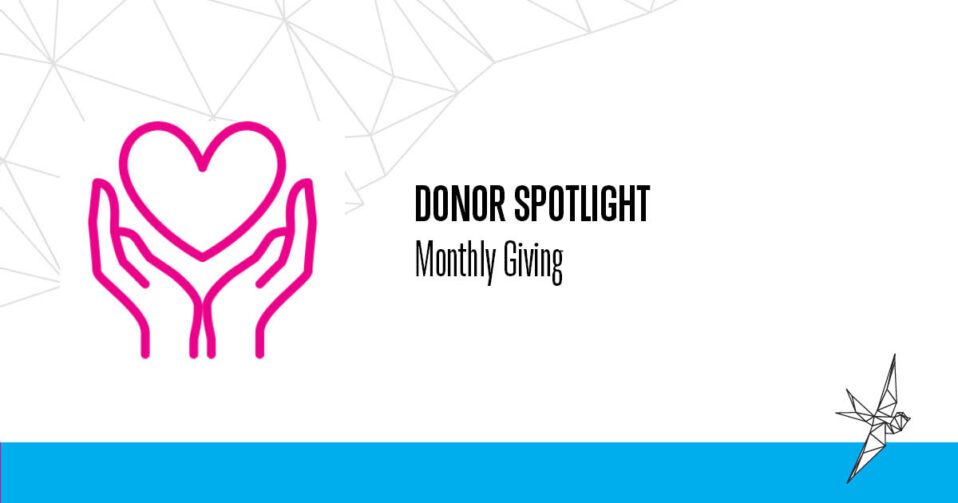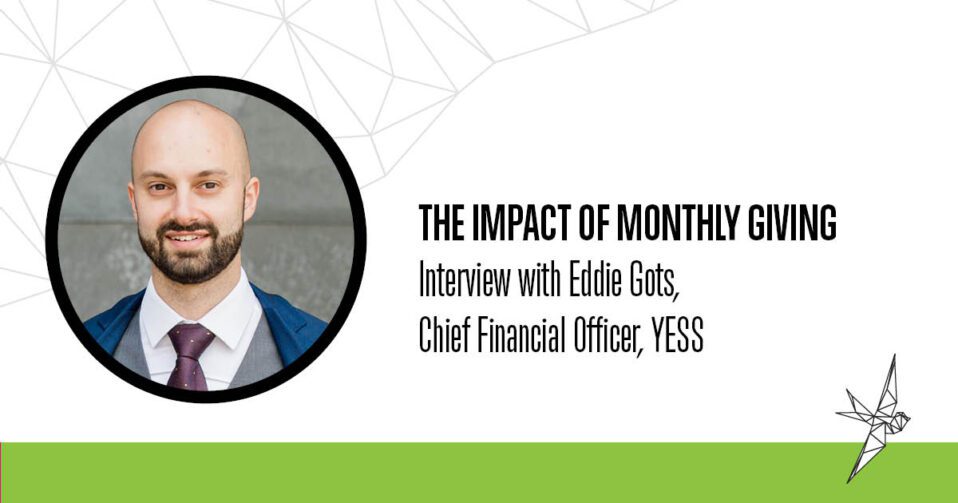Did you know that up to 75% of the YESS annual operating budget is provided for through donations like yours? This month, we talked to Eddie Gots, Chief Financial Officer at YESS, about the impact of community support and opportunities like monthly giving, and how that provides not only funding but also a sense of stability and consistency for youth and staff.
Tell us a bit about yourself and your position at YESS!
I’m the Chief Financial Officer here at YESS. I wear a lot of hats, working with Finance, Fund Development, and Marketing and Communications teams. But the way I would describe my role is I lead teams that do the behind-the-scenes work—or the work that you would see not related with working with youth in crisis—in order to provide stability and the ability and assurances for the teams doing that really difficult frontline work. That means that our Programs and Facilities teams have the confidence that they will have access to the tools and the funding that they need to do their work, and they will get the support and the awareness needed as well.
What makes monthly giving such an impactful way to support YESS?
Monthly giving gives us a sense of security and predictability. Funding from donors and community-based partners are amazing in how they support what we do and how we do it and what we can do. But what it doesn’t come with is a guarantee that someone is going to give money every time at the same time every year. And it makes it hard for us to then forecast and predict the way that we need to spend money, against how or when the money is going to come in.
Becoming a monthly donor gives us a sense of security so that we know we’re going to get that $20 every month. And then we know that this $20 cost that’s going to happen every month is going to be sustained by this $20 donation. It really takes the guesswork out of running the operations and having an idea or predicting what we will have to be able to spend so that we can be fiscally responsible, and not overspend or underspend at any given point in time. It gives us a security blanket of something that we can rely on.
How important is community support when it comes to YESS programs and 24/7 access?
To me, this takes me back to the topic of my role, doing the background work at YESS and providing that sense of sustainability and stability for the staff. The work that our teams do 24/7 in the community with youth has a lot of instability. And it’s not predictable. You can’t predict that crisis going to happen every day at 3PM or 5PM or 2AM, or on Saturday or Monday or Wednesday. It’s very unpredictable, and so what support like monthly giving does is create a security blanket that gives us an element of control, so that we can manage when the unpredictable happens.
By building in that sense of ownership and giving that type of empowerment to the staff to know that they’re going to have funds and resources available to be able to tackle things that are ever-changing gives them the ability to pivot as needed, without needing to wait for the bureaucracy, or needing to send something up the chain, or not being able to make the decision because they’re unsure of when something’s going to happen. They know what they have. They can use what they have to be able to make decisions rapidly and quickly in the best interests for youth.
What is one thing you wish the community knew about youth who access YESS?
That’s always a hard one to answer. There are lots of things that I want people to know. And it also changes depending on sometimes the day, sometimes the year, sometimes the person I’m talking to.
One thing I think I want people to know about youth who access YESS is that they are our future. When we move forward in life, and we get to positions where we might not be able to take care of ourselves, this generation is who we’re going to expect to be able to rely upon. It’s important to recognize that they’re the generation that is going to succeed us, they’re going to carry on our legacies or help us in those times of need when we can’t help ourselves any further. They deserve to have caring in that kindness now, if we’re going to expect it from them when we need it.


